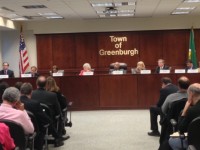Westchester Assembly Delegation Listens to Local Groups During Budget Hearing

On Thursday, Feb. 14, a delegation of New York State Assembly members representing Westchester County convened a three-hour public hearing at the Greenburgh Town Hall to assess the priorities and impacts of Governor Cuomo’s proposed SFY 2013-2014 Budget on residents, communities, organizations, and elected officials of Westchester.
Assemblyman Gary Pretlow (D-Mount Vernon) chaired the delegation. Assembly members in the delegation included Thomas Abinanti (D-Greenburgh), David Buchwald (D-White Plains), Sandy Galef (D-Ossining), Stephen Katz (R-Mohegan Lake), Shelley Mayer (D-Yonkers), Steve Otis (D-Rye) and Amy Paulin (D-Scarsdale). State Senator George Latimer (D-Rye) was also present at the hearing.
Representatives from school districts, not-for-profit agencies providing medical and support services in the health care field, and environmental agencies were the main groups testifying. Across the board the call was for the state to eliminate the pooling of funds that would create a competitive environment and the restoration of funding to 2012 2013 levels.
Unfunded mandates were mentioned, but most of the groups testifying were concerned about the potential for immediate cuts that could put them out of operation.
Brenda Myers, superintendent of the Valhalla Union Free School District, said the formula being used to determine state funding to the different districts had caused her district to be considered the wealthiest in Westchester with budget gap elimination/restoration based on a combined wealth ratio that would severely restrict her district.
“Most of the school districts in Westchester receive $2,000 per student,” she said. This is opposed to the $15,000 to $18,000 per student received by districts in upstate New York where the population is not was wealthy.”
“You have to consider that in Westchester County the cost of living is twice as much as it is upstate, so things cost more,” Myers continued. “And with the 2 percent tax cap you can’t use your own local money to cover a deficit. It’s not fair to put all the districts across the state into one pot competing for the same dollars.”
Myers also noted, and it was echoed by other district representatives, that tax certioraris were a big problem across the county with most schools worried about future indebtedness.
Neighborhood Associations from Yonkers asked for help with flooding along the Sprain Brook and Bronx Rivers, citing severe conditions and lack of action by responsible state agencies including the Department of Transportation.
White Plains based Citizens Campaign for the Environment applauded the governor’s environmental policies, but said much more was needed for flood prevention. They also asked the delegation to keep hydro-fracking out of the state budget.
Health related agencies from an anti-tobacco league to Planned Parenthood to an agency providing support for children with autism came forward with concerns about lack of specific funding for their programs and asked for a return to 2013 numbers.
Regarding health funding, Assemblywoman Paulin said that the proposed executive budget consolidated $60 million that would be pooled among 12 different program areas. Not agreeing with the concept, Paulin said: “I can tell you the pool for all issues and programs involved is a terrible idea and there is a tremendous movement among the assembly members to counter it. Even the Health chair, who also does not think it is a good idea, is against it. I think we should have the support to pull it out,” Paulin concluded.
Jumping off of Paulin’s comments, Assemblyman Abinanti said: “There is a very disturbing characteristic to this budget. It has perfected the art of making it look like you are funding programs when in fact you are cutting programs. In every area of the budget there is a combination of programs supposedly into one pool, but then a significant cut when you compare the amount of money that those programs got in this current year with what’s being proposed in this budget. It is happening in every area. It is also an indication of an attempt by the executive branch to assume more power; to take power away from the people’s representatives, the legislators. Because when you put it into a grant program, the executive now can determine how much money should go into each area rather than the legislature determining how much money should go into each area and the executive branch also sets the standards for what the competition will be. So they could, by setting those standards, eliminate a whole series of programs. I personally object to format of the budget and the way programs are being funded.”
One person testifying related the competitive nature of the pooling concept to “The Hunger Games.”
Other comments considered the possible danger of programs currently funded by county government that were being pulled back by the state and placed into insurance networks, a possible loss of several millions of dollars to important programs according to Abinanti.

